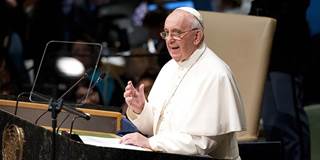In September, the UN and Pope Francis both called on the international community to fight poverty and preserve the environment. At the center of these efforts will be education – particularly one goal on which the world is still falling short: literacy.
PHILADELPHIA – Few public figures have captivated America’s attention quite as much as Pope Francis did when he visited the United States in September. During his six-day tour, he challenged Americans to contemplate the issues of poverty, social justice, and climate change in the context of a shared but increasingly inharmonious planet.



PHILADELPHIA – Few public figures have captivated America’s attention quite as much as Pope Francis did when he visited the United States in September. During his six-day tour, he challenged Americans to contemplate the issues of poverty, social justice, and climate change in the context of a shared but increasingly inharmonious planet.